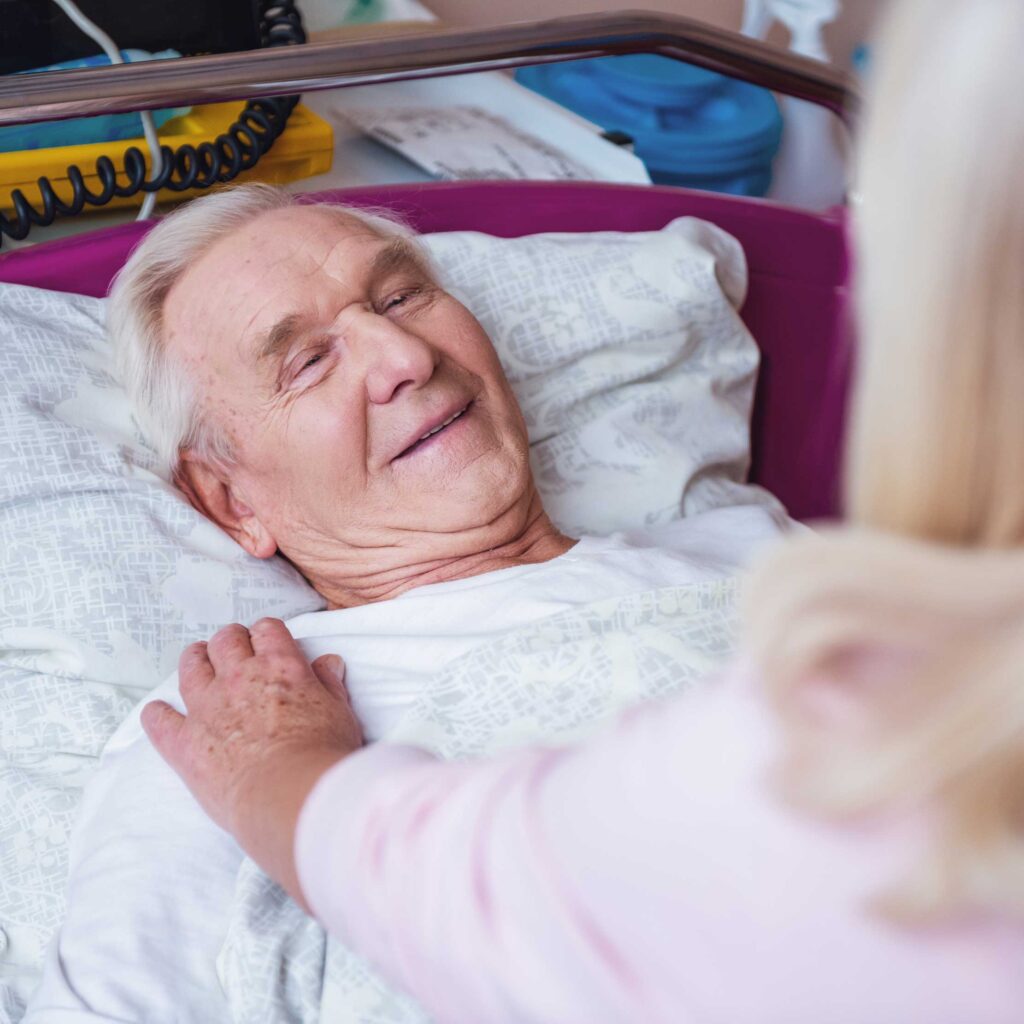Patients who receive home care services after surgery show remarkable results. Their hospital readmission rates are 70% lower than patients who stay in medical facilities. Recovery happens faster when patients heal in familiar surroundings, and this substantially improves their outcomes.
Professional in-home care offers advantages that family members cannot provide on their own. These services combine skilled nursing, physical therapy, and specialized medical attention to follow proper recovery protocols. Research proves that patients under professional home healthcare face fewer complications. Their hospital readmission rates stay lower at 30, 60, and 90-day checkpoints. The specialized care team manages medication schedules and responds quickly to complications. This creates a safer recovery environment that reduces stress for patients and their families.
Let us show you how professional home care services can change your post-surgery recovery experience. You’ll get expert medical support right at home while reducing your risk of infection.
Why Professional In Home Care After Surgery Outperforms Family Caregiving
Families often debate between handling post-surgical care themselves or hiring professionals. Research shows that professional in-home care provides unique advantages that family caregiving cannot match.
Clinical expertise that family members lack
Studies reveal that family caregivers feel unprepared and lack the knowledge needed to provide proper care. This knowledge gap creates serious risks. Poor execution of basic care can threaten patient safety, quality of life, and overall recovery.
Professional caregivers bring specialized healthcare training that addresses these concerns. Registered nurses and licensed practical nurses who provide home care after surgery possess critical skills in:
- Wound care and infection prevention
- Medication management and monitoring for side effects
- Early detection of post-surgical complications
- Specialized protocols for different surgical procedures
Professional caregivers work under healthcare professionals’ supervision who can adjust care plans based on the patient’s changing condition. This clinical oversight will give a recovery that follows medical best practices instead of well-intentioned but potentially harmful improvisation.
Objective assessment of recovery progress
Family members don’t deal very well with objectively assessing a loved one’s recovery due to emotional attachment. Professional caregivers can assess progress with clinical detachment and monitor healing accurately.
Professional home healthcare providers monitor vital signs regularly to detect concerning changes early. This vigilant approach helps them identify potential complications before they become serious and prevent hospital readmissions. Research shows that hospitalization may extend by several days if complications aren’t caught early, which highlights professional monitoring’s value.
Healthcare professionals document recovery milestones systematically to provide valuable information to the surgical team. This documentation creates a full picture of recovery progress that family caregivers cannot replicate without medical training.
Reduced emotional strain on relationships
The most overlooked benefit of professional in-home care after surgery lies in preserving family relationships during stressful times. Family members carry a substantial caregiving burden. Studies show family caregivers spend an average of 20.4 hours per week on caregiving tasks. Women typically provide more hours (21.9 vs. 17.4 hours/week).
This burden often results in caregiver burnout. Family caregivers experience symptoms of anger, depression, and anxiety that lead to demoralization and exhaustion. Physical stress and strain can occur as family members help patients with walking, transferring, or lifting. Professional caregivers receive training to perform these tasks safely.
Professional care creates healthier boundaries. Family members can focus on providing emotional support instead of managing medical tasks. This separation of roles prevents resentment that can develop when medical caregiving strains intimate relationships.
Professional home care services after surgery create a safer recovery environment and preserve everyone’s emotional health. Family members want to help naturally. The data shows that professional care guides better clinical outcomes, more accurate progress assessment, and healthier relationships throughout recovery.

Medical Benefits of Specialized After Surgery Home Care
Professional support can address medical challenges that arise after surgery. Research confirms that specialized home care after surgery provides measurable medical advantages that positively affect patient outcomes.
Reduced infection rates
Post-surgical infections pose a serious threat to recovery. Studies show that home care substantially decreases this risk. Research indicates that about 3.5% of patients in healthcare facilities developed infections during their stay, which often led to emergency treatment or hospitalization. Home environments naturally reduce exposure to hospital-acquired infections that occur in medical facilities despite their best sanitation efforts.
Professional caregivers follow strict infection control protocols designed specifically for home settings. These trained professionals use proper wound care techniques with sterile equipment. They watch surgical sites carefully for early signs of infection and keep the home environment clean throughout recovery.
Lower risk of complications
Post-surgical complications range from minor discomforts to life-threatening conditions, such as shock, hemorrhage, deep vein thrombosis, and pulmonary complications. Professional home care after surgery offers continuous assessment that identifies potential issues before they become serious problems.
Skilled nurses evaluate vital signs and surgical sites regularly, which allows early intervention when complications start to develop. They also use preventive measures such as proper positioning, early mobilization, and breathing exercises that reduce complications.
To cite an instance, trained professionals know that temporary disruption of peristalsis occurs after surgery and causes symptoms like nausea and vomiting. Their expertise helps them address these issues quickly with appropriate interventions before they become more serious conditions.
Faster healing through proper techniques
Specialized home care after surgery speeds up recovery. Home health professionals use proven techniques that help healing:
- Personalized wound care protocols that adapt as conditions change
- Early and appropriate physical activity that balances rest with helpful movement
- Nutritional guidance that focuses on proteins and nutrients needed for tissue repair
- Proper medication administration that ensures optimal therapeutic effects
Studies showed that patients who received home care moved around more freely than those in hospital beds, which substantially improved outcomes. This mobility advantage helps circulation, reduces blood clot risk, and supports overall recovery.
Prevention of hospital readmissions
The most compelling evidence for specialized after-surgery home care comes from readmission statistics. Research reveals that patients with home healthcare had a 70% lower risk of readmission compared to those recovering in hospital settings.
Medicare patients who received professional home healthcare after an inpatient admission had substantially fewer hospital readmissions at 30, 60, and 90 days, along with lower overall healthcare costs. Surgical patients showed better results compared to those admitted for medical diagnoses.
Several factors unique to professional home care prevent readmissions:
- Ongoing assessment that spots potential problems early
- Medication management that prevents adverse drug events
- Smooth communication with the surgical team about recovery progress
- Education that enables patients in self-care while providing professional backup
Studies show professional home care programs reduced both readmission numbers and hospital stay length. This benefit becomes especially important for patients with chronic conditions like heart failure.
These substantial medical benefits make temporary home care after surgery more than just a comfort choice – it’s a clinically sound decision that supports the best recovery outcomes.

The Comfort Advantage: Recovering in Familiar Surroundings
People would rather recover at home than in a hospital. They see going home as a most important step in their recovery experience. This isn’t just about being comfortable – research shows that familiar surroundings help people recover better.
Better sleep in your own bed
Quality sleep plays a vital part in healing after surgery, but hospitals make it hard to rest well. A complete study from the Netherlands found that people in hospitals slept less, woke up more often at night, and had to get up much earlier compared to being at home. These sleep problems happened because:
- Hospital staff checked on patients during the night
- Other patients and medical equipment made noise
- Light came in from hallways and rooms
- Patients needed frequent bathroom trips at night
So patients who get temporary home care after surgery sleep better in their own beds without these disturbances. Studies show hospital noise levels are higher than what the World Health Organization recommends for good sleep. At home, you can control the noise, light, and temperature – all of which help you sleep better after surgery.
Tailored environment for healing
The benefits go beyond better sleep. A familiar space provides emotional comfort that speeds up healing. Patients say home is “a safe and familiar environment that accelerated recovery through nurturing support of loved ones”. This emotional comfort does more than just feel good – it helps physical recovery too.
Research shows patients get better faster at home than in hospitals. Home care services let patients stay near their personal things, which creates security that helps both physical and emotional healing. Professional caregivers make this even better by handling medical needs while you retain control of your recovery space.
Maintaining daily routines when possible
We noticed that patients who recovered more at home became more independent. They only needed help with complex tasks, not everyday activities. This independence comes in part from moving around more – patients can walk more freely at home than when they’re stuck in hospital beds.
Knowing how to keep some normal routines while getting in-home care after surgery helps both body and mind. Your home lets you be flexible with daily schedules. You can balance rest with normal activities. Professional caregivers help maintain this balance by making sure you don’t do too much while still keeping your usual routine.
Home recovery also means no strict visiting hours, so friends and family can visit when it works best. This support from loved ones, plus professional medical care, creates the perfect healing environment that hospitals just can’t match.
How Temporary Home Care After Surgery Reduces Family Stress
Family members who care for patients after surgery often face unexpected relationship challenges. Research shows family caregivers spend over 20 hours each week on care tasks. Women put in even more time (21.9 vs. 17.4 hours/week). Professional home care services give families a better option that protects relationships and ensures proper medical care.
Eliminating caregiver burnout
Caregiver burnout poses a real threat to both caregivers and patients. Family members who provide unpaid care show much higher stress levels than those who don’t. This burnout shows up as:
- Physical and emotional exhaustion
- Increased anxiety and depression
- Resentment toward the patient
- Sleep problems and health issues
Research shows anxiety becomes the biggest worry for family members during recovery. Professional caregivers work in shifts and don’t face the round-the-clock responsibility that wears people down. Their training helps them handle complex medical tasks quickly, which reduces the strain untrained family members feel.
Allowing family to focus on emotional support
Home care after surgery creates a natural split in responsibilities. Medical tasks go to professional caregivers while family members provide vital emotional support. Patients who see their families as supportive and reassuring show better health outcomes and behavior.
Most family members don’t have the clinical skills they need, which leaves them feeling unprepared. This creates worry about hurting their loved one through mistakes. Professional in-home care lets families focus on giving emotional support that helps recovery without the stress of medical complications.
Maintaining healthy boundaries during recovery
Clear boundaries help keep relationships healthy throughout recovery. Without them, people start feeling obligated and resentful, which can poison relationships. Professional post-op home care naturally creates these boundaries by keeping medical care separate from family dynamics.
Experts say there’s nothing wrong with standing up for yourself when setting boundaries. Many family members feel guilty about needing personal space while caring for someone. Professional caregivers solve this problem by handling medical needs while respecting everyone’s boundaries.
Professional home care after surgery takes the pressure off families through expert knowledge that family members don’t have. This setup prevents burnout, makes room for emotional support, and keeps the boundaries needed to protect important relationships during tough recovery periods.

Customizing Professional Care to Your Specific Surgery
Research shows that custom recovery plans boost patient outcomes by 30-45% and patient satisfaction by 40-60%. Professional care after surgery works differently for each person. Family caregivers often struggle to match this level of personalized care.
Specialized protocols for different procedures
Professional home care services after surgery use proven protocols designed for specific surgeries. Patient outcomes improve by a lot across surgical specialties with the Perioperative Surgical Home (PSH) model’s team-based care approach. Family members lack the training needed to follow these specialized protocols properly.
Each surgery needs its own approach. Orthopedic recoveries need mobility protocols that differ from abdominal or cardiac surgeries. Using the right specialized equipment improves functional outcomes by 30-45% and cuts recovery time by 15-25%. Cardiac surgery patients need different monitoring priorities. Studies show that specialized cardiac recovery supplies cut post-discharge complications by 30-50%.
Adaptive equipment and techniques
Professional in-home care after surgery uses specific adaptive equipment based on your procedure. The Journal of Surgical Research shows that proper abdominal surgery recovery supplies reduce lung complications by 40-60%. Trained professional caregivers know how to use:
- Mobility aids that match your surgical limitations
- Specialized wound care equipment for each surgical site
- Custom medication management systems that cut errors by 50-70%
Trained professionals use this specialized equipment to create a safer recovery environment than most families can provide.
Coordination with your surgical team
Professional post-op home care keeps open communication with your surgical team. Home health teams follow specific doctor protocols. Your surgeon’s recommendations guide their care. Studies prove that well-laid-out recovery support networks reduce complications by 25-40%.
Care plans match your medical history, surgical procedure, and personal priorities. Regular progress reports help your surgical team adjust your recovery plan quickly. Family caregivers try their best but rarely achieve this smooth coordination between home care and your surgical team.

Is Home Care the Answer?
Professional home care services change post-surgical recovery through specialized medical expertise. These services reduce infection risks and ensure proper healing techniques. Studies show that patients heal better at home while getting expert care. The data reveals 70% lower hospital readmission rates compared to facility-based recovery.
Family members want to help loved ones recover. However, trying to provide medical care guides them toward stress and burnout. This often strains relationships. Professional caregivers possess clinical knowledge and specialized training that family members cannot match. This creates a safer recovery environment for everyone.
Professional home care after surgery offers more than convenience. It provides measurable benefits through customized recovery plans and proper medical monitoring. The care team manages to keep family relationships intact. This specialized support helps patients heal faster. Family members can focus on giving emotional support instead of dealing with complex medical tasks.
FAQs
Q1. What are the benefits of professional home care services after surgery? Professional home care services offer specialized medical expertise, reduced infection risks, and proper healing techniques. They lead to 70% lower hospital readmission rates compared to facility-based recovery and allow patients to recover in the comfort of their own homes.
Q2. How does recovering at home compare to recovering in a hospital? Recovering at home often leads to better sleep, faster healing, and improved overall comfort. Patients can maintain some daily routines, have more control over their environment, and receive unrestricted visits from family and friends, all of which contribute to a more positive recovery experience.
Q3. Can professional home care services reduce stress on family members? Yes, professional home care services can significantly reduce family stress by eliminating caregiver burnout, allowing family members to focus on providing emotional support rather than medical care, and maintaining healthy boundaries during the recovery process.
Q4. How are professional home care services customized for different surgeries? Professional caregivers follow evidence-based protocols tailored to specific surgeries, use adaptive equipment and techniques suited to each procedure, and coordinate closely with the surgical team to ensure personalized care plans that improve recovery outcomes by 30-45%.
Q5. What should I do if I don’t have anyone to care for me after surgery? If you don’t have family or friends available to help, contact your hospital’s social services department to explore available options. They can assist in arranging professional home care services, temporary observation at the hospital, or other support to ensure you receive proper post-surgical care.


